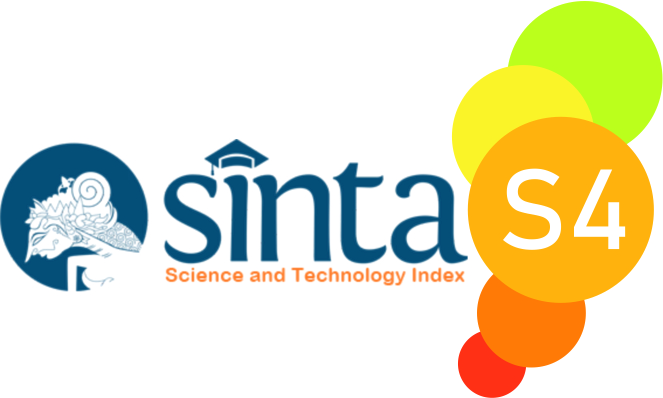Students’ Motivation in Completing English Assignments in Online Learning During Covid-19 Pandemic
Abstract
This research aimed to identify students’ levels and the types of motivation that they apply the most to completing their English assignments in online learning at class X in SMAN 1 Sajingan Besar in the academic year 2020-2021. The researcher conducted descriptive research and collected the data using a questionnaire given to 68 students. The first result revealed that students’ motivation for completing their English assignments in online learning was in the middle category at 70.23%. Meanwhile, the second result showed that the type of motivation students applied the most was extrinsic motivation, with 73,68%. The majority of the conditions contributing to students' extrinsic motivation were related to feeling guilty, being aware of the need to improve their English skills, and feeling proud when completing it on time. Then, the students were influenced intrinsically by their feelings of satisfaction and enjoyment. However, amotivation also occurred because of a lack of awareness and a lack of vocabulary mastery. These findings suggest that, even though extrinsic motivation was quite high, students had to have intrinsic motivation and complete their assignments with interest, enjoyment, and satisfaction. The teacher and the parents must support students harder to help them complete assignments in online learning.
References
Amiryousefi, M. (2016). Homework: Voices from EFL teachers and learners. Iranian Journal of Language Teaching Research, 4(2), 35–54.
Ary, D., Jacobs, L. C., & Sorensen, C. (2009). Introduction to research in education. In Wadsworth (8th ed., Vol. 4, Issue 3). Cengage Learning.
Basilaia, G., & Kvavadze, D. (2020). Transition to online education in schools during a SARS-CoV-2 Coronavirus (COVID-19) pandemic in Georgia. Pedagogical Research, 5(4). https://doi.org/10.29333/pr/7937
Fiddiyasari, A., & Pustika, R. (2021). Students’ motivation in English online learning during Covid-19 Pandemic at SMA Muhammadiyah Gadingrejo. Journal of English Language Teaching and Learning, 2(2), 57–61.
Fitrah, M., & Luthfiyah. (2017). Metodologi penelitian: Penelitian kualitatif, tindakan kelas & studi kasus. CV Jejak.
Gay, L. R., Mills, G. E., & Airasian, P. (2012). Educational research: Competencies for analysis and application (10th ed.). Pearson.
Gossti, O. M. (2016). Students’ perception towards the use of online homework to increase their motivation. Universitas Kristen Satya Wacana.
Hapsari, S. P. (2018). Students’ difficulties in learning English at a state vocational high school. In Repository UMY.
Hartnett, M., St. George, A., & Dron, J. (2011). Examining motivation in online distance learning environments: Complex, multifaceted, and situation-dependent. International Review of Research in Open and Distance Learning, 12(6), 20–38. https://doi.org/10.19173/irrodl.v12i6.1030
Indriyono, H., Budiraharjo, M., & Bram, B. (2022). Assessing Vocational High School EFL Teachers’ Technological Pedagogical Content Knowledge in Online Learning. Journey: Journal of English Language and Pedagogy, 5(2), 310–319. https://doi.org/10.33503/journey.v5i2.2115
Jannah, M., Sahiruddin, & Rusmawati, R. (2022). Examining the motivation to read and its relationship. Journal of English Language and Pedagogy, 5(2), 216–228.
Kasi, Y. E. M., Suparno, S., & Asib, A. (2021). Parents’ perception: Roles and involvement in distance learning amid the Covid-19 Pandemic. AL-ISHLAH: Jurnal Pendidikan, 13(3), 1877–1887. https://doi.org/10.35445/alishlah.v13i3.1170
Kompri. (2015). Motivasi pembelajaran motivasi guru dan siswa. PT Remaja Rosdakarya Offset.
Mahadi, T. S. T., & Jafari, S. M. (2012). Motivation, its types, and its impacts in language learning. International Journal of Business and Social Science, 3(24), 230–235.
Mulyani, S. (2020). Students’ perception and motivation toward English e-learning during covid-19 pandemic. State Institute For Islamic Studies (IAIN) Salatiga.
Oletić, A., & Ilić, N. (2014). Intrinsic motivation, extrinsic motivation, and learning English as a foreign language. ELTA Journal, 2(2), 23–38. https://doi.org/10.2466/pr0.99.7.813-818
Putri, A. F., Andriningrum, H., Rofiah, S. K., & Gunawan, I. (2019). Teacher function in class: A literature review. Advances in Social Science, Education and Humanities Research, 382, 5–9. https://doi.org/10.2991/icet-19.2019.2
Ryan, R. M., & Deci, E. L. (1985). Intrinsic motivation and self-determination in human behavior. Plenum Press.
Ryan, R. M., & Deci, E. L. (2000). Self-determination theory and the facilitation of intrinsic motivation, social development, and well-being. American Psychologist, 55(1), 68–78. https://doi.org/10.1037/0003-066X.55.1.68
Ryan, R. M., & Deci, E. L. (2002). The paradox of achievement: The harder you push, the worse it gets. In Improving Academic Achievement (pp. 61–87). Elsevier Science.
Teimouri, Y. (2018). Differential roles of shame and guilt in l2 learning: How bad is bad? Modern Language Journal, 102(4), 632–652. https://doi.org/10.1111/modl.12511
Tze, V. M. C., Daniels, L. M., & Klassen, R. M. (2015). Evaluating the relationship between boredom and academic outcomes: A meta-analysis. Educational Psychology Review, 28(1), 119–144. https://doi.org/10.1007/s10648-015-9301-y
Ulfaminingsih, AM, A., & Setiadi, M. A. (2021). The students’ perception of rewards and punishment toward their motivation in English learning. English Language Teaching Methodology, 1(2), 13–20.
Van Der Spoel, I., Noroozi, O., Schuurink, E., & Van Ginkel, S. (2020). Teachers’ online teaching expectations and experiences during the Covid19-pandemic in the Netherlands. European Journal of Teacher Education, 43(4), 623–638. https://doi.org/10.1080/02619768.2020.1821185
Viner, R. M., Russell, S. J., Croker, H., Packer, J., Ward, J., Stansfield, C., Mytton, O., Bonell, C., & Booy, R. (2020). School closure and management practices during Coronavirus outbreaks including COVID-19: A rapid systematic review. The Lancet Child and Adolescent Health, 4(5), 397–404. https://doi.org/10.1016/S2352-4642(20)30095-X
World Health Organization. (2020). Listings of WHO’s response to COVID-19.
Yusuf, N., & Al-Banawi, N. (2013). The impact of changing technology: The case of E-learning. Contemporary Issues in Education Research, 6(2), 173–180.
Copyright (c) 2023 Adelia Nurhidayah, Endang Susilawati, Surmiyati Surmiyati

This work is licensed under a Creative Commons Attribution-ShareAlike 4.0 International License.

Journey: Journal of English Language and Pedagogy by http://ejurnal.budiutomomalang.ac.id/index.php/journey/index is licensed under a Creative Commons Attribution-ShareAlike 4.0 International License.






